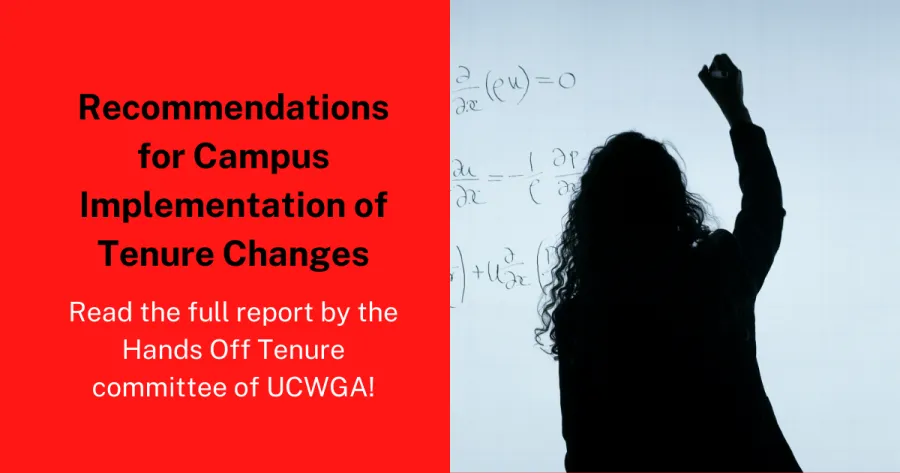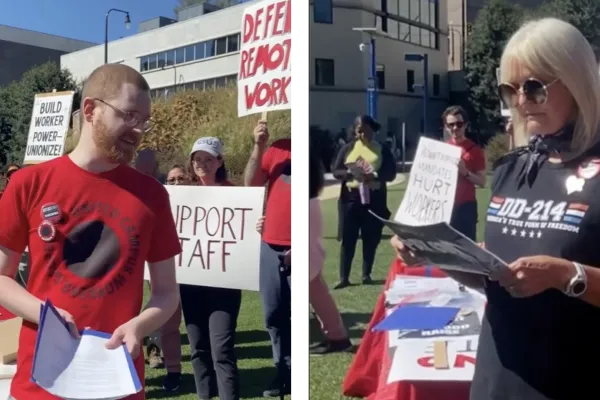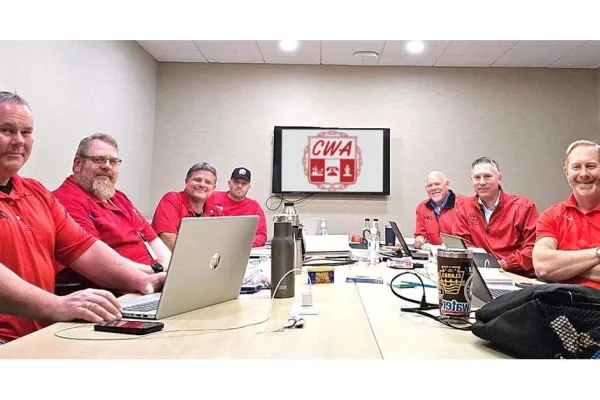Recommendations for Campus Implementation of USG/BOR Tenure Changes

Read the full report on how campus committees charged with implementing changes can mitigate the damage of these policy changes and protect academic freedom and tenure to the greatest extent possible.
Introduction
United Campus Workers of Georgia oppose the October 2021 changes to section 8.3 the USGBOR Policy Manual(specifically sections 8.3.5.1, 8.3.5.4, 8.3.6, 8.3.6.1, 8.3.7.1, 8.3.7.2, 8.3.7.3, 8.3.9). These changes weaken academic freedom and tenure in Georgia’s public universities and have triggered an AAUP investigation that will almost certainly result in censure of the USGas soon as March 2022.
The changes and imminent AAUP censure significantly harm the ability of USG institutions to recruit and retain talented faculty, which will in turn hurt the reputation and rankings of USG’s institutions and ultimately harm Georgia’s economy. Further, the changes expand centralized authority and bureaucratic procedures that redirect taxpayer dollars and student tuition monies away from teaching our students. Such a move towards centralized authority is at odds with SACSCOC’s emphasis on institutional autonomy and threatens the accreditation status of Georgia’s public universities.
Advocates of these changes present them unconvincingly as minor revisions intended to ensure accountability of public universities and the faculty who teach at them. Many see the changes instead as part of a broader “culture wars” attack on universities as sites feared by the right to be engaged in supposed liberal indoctrination.
The general state of worker protections in Georgia, an at will employment state, suggests another motivation and consequence of these changes. Tenure protections are a barrier to top down control and offer a contrast to the job precarity that most workers experience. The prohibition on public sector collective bargaining in Georgia further enforces this precarity. While the proportion of tenured faculty has already been drastically decreased through a growing reliance on non-tenure track and part-time faculty, their continued presence sets an example of a workforce entitled to job protections, due process, and a say in how their workplaces are managed. While these are protections all workers should be entitled to, rolling them back for faculty (one of the few job sectors where they exist in Georgia) serves the interests of those who want workers to remain pliable and afraid to demand more from their employers.
The only way to reverse the damage of these changes is to repeal the language immediately.
Regrettably, the BOR and USG appear unlikely to do so at this time and are instead moving ahead with an aggressive timeline for campus committees across this system to implement these changes by writing them into University and Faculty Handbooks and eventually College and Departmental Guidelines. While we continue to strenuously oppose these changes and call for their reversal, we offer these recommendations to the campus committees charged with implementing them as a guide for ways to mitigate the damage of these policy changes and protect academic freedom and tenure to the greatest extent possible.
We offer recommendations related to five substantive changes:
BOR Authority to Award/Deny Tenure
Academic Due Process and Post-Tenure Review
Student Success Activities
Administrative Post-Tenure Review
Implementation Timeline and Grandparent Clauses
1. BOR Authority to Award/Deny Tenure
As per the final sentence of 8.3.7.1 of the BoR policy manual:
“While the Board of Regents has delegated authority for tenure decisions to institution presidents, if an institution is not carrying out its faculty review process in a sufficiently rigorous manner the Board of Regents may move the authority to award tenure to the Board level until institutional processes have been remediated.”
United Campus Workers of Georgia recommend that campus implementation committees be prepared for this sentence to be invoked as a justification for more “rigorous” faculty review processes in order to stave off potential BOR takeover. Such anticipated potential takeover should not be considered an acceptable justification for increasing workload demands on faculty or strengthening punitive measures within faculty review policies, nor for bowing to outside political pressures seeking to curtail teaching and programming related to race and social justice. Annual Review and Promotion and Tenure requirements must continue to be established by faculty committees, consistent with Academic Freedom, and in accordance with disciplinary norms and expectations.
2. Academic Due Process and Post-Tenure Review
As per section 8.3.5.4 of the BOR policy manual, United Campus Workers of Georgia recommend the following implementation guidelines:
- Post-Tenure Review (PTR) should be routed through existing Promotion & Tenure (P&T) Committees to ensure that elected (and accountable) faculty representatives comprise the “committee of faculty colleagues” referred to in the policy language.
Evaluation criteria for PTR should be included in Department, College, and University Promotion and Tenure guidelines. This will ensure that these criteria are approved and revised only through a vote of the appropriate faculty stakeholders.
Any faculty member placed on a “remediation plan” following an “unsatisfactory annual review” should have their performance in the subsequent year evaluated by the appropriate P&T Committee in addition to their Chair/Director and Dean. This will ensure that the decision of whether a faculty member will be required to undergo a “corrective post tenure review” will not be left solely up to administrators.
In cases where administrators seek to apply “remedial actions” which “may include, but are not necessarily limited to, suspension of pay, salary reduction, revocation of tenure, and separation from employment”, the required “due process mechanisms” steps should be the following and referred to in the policy language as “Procedures for the Application of Post-Tenure Review Remedial Actions”. (Note: Anything short of these procedures departs from the standard of “academic due process” required to preserve more than tenure in name only in Georgia):
Procedures for the Application of Post-Tenure Review Remedial Actions
A remedial action shall be preceded by statement of charges or grounds for such action if requested by the faculty member, including a statement that the faculty member shall have the right to be heard by a faculty hearing committee, which shall consist of not fewer than three or more than five impartial faculty members appointed by the executive committee (or its equivalent) of the highest legislative body of the faculty, from among the members of the entire faculty of the institution. Members of the hearing committee may serve concurrently on other committees of the faculty.
When the hearing committee is called into session, it shall elect a chair from among its membership. The hearing committee will meet as a body when it is called into session by the chair at the chair’s discretion or upon the request of the President or the faculty member who is subject to remedial actions. A minimum of three committee members is required for any vote or official action to be taken.
A hearing committee member should remove himself or herself from the case, either at the request of a party or on his or her own initiative, if he or she deems himself or herself disqualified for bias or interest. Each party shall have a maximum of two challenges without stated cause that shall be made in writing and filed with the chair of the hearing committee at least five days in advance of the date set for the hearing.
Additionally, the chair may decide whether a member of the committee should be disqualified for cause. If a committee member is removed, the replacement shall be made in the same manner as the original committee was selected. If the chair is removed, the committee shall elect a new chair after committee replacements have been appointed.
Post-Tenure Review Remedial Action Procedures
When a hearing is requested, the following hearing procedures shall apply:
Service of notice of the hearing with specific reasons or charges against the faculty member together with the names of the members of the hearing committee shall be provided to the charged faculty member in writing at least 20 days prior to the hearing. The faculty member may waive a hearing or respond to the charges in writing at least five days in advance of the date set for the hearing. If a faculty member waives a hearing, but denies the charges or asserts that the charges do not support a finding of adequate cause, the hearing committee shall evaluate all available evidence and rest its recommendation upon the evidence in the record.
The hearing committee, in consultation with the President and the charged faculty member, may exercise its judgment as to whether the hearing should be public or private in accordance with applicable law.
During the proceedings the charged faculty member, the administration, and the hearing committee may each have advisory or counsel of his, her, or their choice.
At the request of either party or the chair of the hearing committee, a representative of a responsible education association shall be permitted to attend the hearing as an observer.
A tape recording or transcript of the proceedings shall be kept in accordance with institution policies and procedures and made available to the charged faculty member and the administration in the event an appeal is filed.
An oath or affirmation shall be administered to all witnesses by any person authorized by law to administer oaths in the State of Georgia.
The hearing committee may grant adjournments to enable either party to investigate evidence as to which a valid claim of surprise is made.
The charged faculty member and the administration shall be afforded a reasonable opportunity to obtain necessary witnesses and documentary or other evidence.
The charged faculty member and the administration will have the right to confront and cross-examine all witnesses. Where the witness cannot or will not appear but the committee determines that the interests of justice require the admission of his or her statement, the committee will identify the witness, disclose the statement, and, if possible, provide for interrogatories.
The hearing committee is not bound by strict rules of legal evidence and may admit any evidence that is of probative value in determining the issues involved. Every possible effort will be made to obtain the most reliable evidence available. All questions relating to admissibility of evidence or other matters shall be decided by the chair or presiding officer of the committee.
The findings of fact and the decision of the hearing committee will be based solely on the hearing record.
Except for announcements concerning the time of the hearing and similar matters, public statements, and publicity about the case by either the charged faculty member or administrative officer should be avoided until the proceedings have been completed, including consideration by the Board of Regents in the event an appeal is filed.
The President and the charged faculty member shall be notified in writing of the decision and recommendation, if any, of the hearing committee. If the hearing committee concludes that adequate cause for remedial actions has not been established by the evidence in the record, it will advise the President. If the President does not approve the committee’s decision, he or she should state his or her reasons in writing to the committee for response before rendering his or her final decision. If the committee concludes that an academic penalty less than the proposed remedial action would be more appropriate, it may so recommend with supporting reasons. The President may or may not follow the recommendations of the committee.
After complying with the foregoing procedures, the President shall send an official letter to the charged faculty member notifying him or her of the President’s decision. Such letter shall be delivered to addressee only with receipt to show to whom and the address where delivered. The letter shall clearly state any charges that the President has found sustained and shall notify such person that he or she may apply for discretionary review as provided for in Board of Regents’ Policy.
Should the President’s decision dictate separation from employment as the appropriate remedial action, the faculty member shall be suspended from employment without pay from the date of the final decision of the President. Should the remedial actions be reversed pursuant to an application for discretionary review under Board of Regents’ Policy, he or she shall be compensated from the date of the suspension and/or application of any alternate remedial actions.
3. Student Success Activities
As per sections 8.3.6.1 the BOR policy manual requiring “noteworthy involvement in student success activities” for all Professorial ranks, United Campus Workers of Georgia recommend the following implementation guidelines:
Do not create a 4th evaluation category called Student Success Activities. Campuses have the discretion to embed these activities in the existing elements of Research, Teaching, and Service and should do so to minimize the workload implications of this change.
Review existing requirements in Promotion and Tenure Guidelines and identify the myriad of activities already required that contribute to student success. For example existing guidelines may already refer to advising student groups, holding office hours, writing letters of recommendation, modifying courses based on student outcomes, participating in curriculum and assessment committees etc. To the extent these activities are already included, campus implementation committees should highlight them and resist adding new language to codify or expand the meaning of “involvement in student success activities.” Campus implementation committees should emphasize the amount of time faculty already spend on student success work (whether through formal committee assignments recognized in service, or in individual modifications to courses based on student’s work and student evaluations recognized as part of teaching duties) and that these activities are already noted and discussed in every annual review and multi-year review.
Seek ways to frame “involvement in student success activities” such that faculty evaluations in Teaching go beyond the flawed metric of student course evaluations.
Avoid any language that could be construed as holding faculty individually responsible for student grades. Involvement in student success activities should not be evaluated through monitoring of average class grades, DFWs (Drop, Withdrawal, Fail), or RPGs (Retention, Progression, and Graduation) rates for specific faculty or specific courses. Doing so places pressure on faculty to lower standards or rigor and denies the many factors beyond faculty control that affect these metrics.
Advocate for workload offsets and/or forms of additional credit and administrative support in exchange for any increased expectations with regard to involvement in student success activities. Adopt language insisting that administrators and the USG demonstrate their commitment to student success by reducing teaching loads and class sizes and other workload expectations should they wish to see faculty increase the amount of time they spend on student success activities beyond what is already included in existing guidelines.
4. Administrative Post-Tenure Review
As per the final paragraph of section 8.3.5.4 of the BOR policy manual:
“Each institution shall also develop and implement procedures to conduct post-tenure reviews with tenured faculty members who hold administrative positions. These procedures shall address the distinctive nature of administrators’ work and leadership roles, include constituent feedback, and reflect that tenure is held in faculty positions not in administrative positions. Each institution shall compile and submit an annual report on post-tenure review activity to the Chancellor or the Chancellor’s designee(s).”
United Campus Workers recommend the following implementation guidelines:
Post-tenure review for “tenured faculty members who hold administrative positions” should be routed through existing Post-Tenure Review (PTR) Committees so that the process retains faculty committee input, as PTR committees are composed of elected faculty representatives.
Administrative faculty will be evaluated according to an additional category such as “Administration and Leadership” for the appropriate percentage of their workload.
“Constituent feedback” should consist of a survey of all employees who report to the administrator. These surveys should be administered by an outside party and coordinated by an elected faculty representative. See Kennesaw State University’s administrative review procedures for a model process:https://academicaffairs.kennesaw.edu/policies/administrative-review.php
Constituent feedback should be collected on the following timeline:
The survey period should precede the portfolio submission date so that data is available for the administrative faculty member to review and respond to in their narrative.
For administrative faculty with a new appointment, the surveys should be conducted in the 3rd and 5th year. Following that the surveys will occur every 5th year to coincide with the administrative PTR cycle.
Following the 3rd year feedback process, a recommendation can be made to remove the administrative faculty member from their administrative role, or place them on a probationary period.
- The results of both the 3rd year survey and 5th year review should be made public to the employees who report to that administrator.
The consequences of an unsuccessful administrative PTR are loss of that administrative role. The administrator would then return to a full time faculty role and be evaluated according to the faculty PTR process within 5 years time.
5. Implementation Timeline and Grandparent Clauses
The BOR Policy Manual language does not address implementation timelines but we anticipate that updates to the USG Academic and Student Affairs Handbook will prescribe an aggressive timeline for implementing these changes.
United Campus Workers of Georgia recommends the following implementation guidelines:
Faculty cannot be retroactively held to standards that did not exist during the period of review and should therefore retain the option of being reviewed under previous guidelines. (Note: This is already established practice when P&T guidelines are revised at the department level; faculty retain the option of being reviewed under a previous set of guidelines for at least 1 year).
Campus implementation committees should ensure that timelines account for the time it will take for changes to University level handbooks to be reflected in revised College and Department level P&T Guidelines. All of these steps should be subject to appropriate shared governance procedures.
Given that the results of an Annual Review or a Post-Tenure Review can take 3-6 months to be finalized and most faculty are off contract in June and July, the length of time faculty have to demonstrate improvement when placed on a remediation plan and/or personal improvement plan is limited in many cases to 4 months in the following review period. The remediation plan and/or personal improvement plan should therefore extend into the following review year.
Click to read the report and download it to share with your campus.
Georgia public universities’ ‘return to office’ mandate may spark exodus


